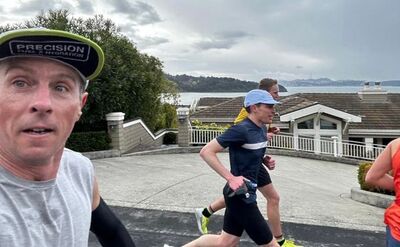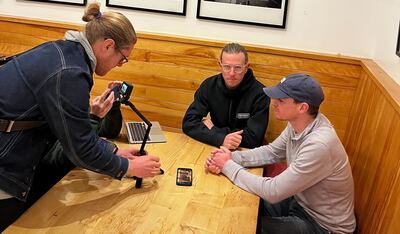Running coach and the morning shakeout host Mario Fraioli wrote a blog for us about the four things that every runner needs to nail in order to ensure they’re prepared for the ultimate endurance running exam - the marathon.
I then caught up with Mario during a trip to California and, after hanging on to Mario’s heels for the first half of his (very fast) 20-mile training run, we enjoyed a well-earned sit down and discussed how he uses training runs to execute his marathon on race day…
Right Mario, thanks for that first-hand schooling in marathon running this morning! You said that you have a love-hate relationship with the distance, so why do you keep coming back for more?
I've had a few that have gone very well and some that have not gone so well. So, when they've gone well, I obviously tend to enjoy them. And when they haven’t, I swear I'm never going to do them again!
My personal best was a 2:27 at the California International Marathon in 2018 and I ran a nearly perfect even split. That was the first time that everything had gone to plan. I paced it well, I was on top of my fueling and kept a good attitude the entire way. In the last 10k, I was just going by people like they were standing still, even though I wasn't running any faster. That was definitely the best one.
The one that didn’t go so well was the 2017 Boston Marathon when it was really hot. I knew I had to adjust my plan, but I didn't. I endured a ‘death march’ for the last 10 miles.
I've seen every side of it as an athlete. And then also as a coach, I've seen it go really well for people and I've definitely seen it go not so well for folks, too.

You said in your blog that if you want to run a good marathon, you've got to run long and fast during training - I discovered that you practice what you preach this morning! So, how would someone gunning for a sub-three hour marathon adopt this approach?
If you want to race a marathon and go after that sub-three, Boston qualifier mark or a PB, rather than just finish the thing, you've got to do specific training. I think there's a common misconception where many people train like 10k runners, so they do their two speed workouts a week - maybe a tempo run and a track session - and they just run long and easy on the weekends. That's not very specific to the demands of a marathon.
The long run has to be one of your key sessions, and you have to practice the pacing and fueling for running for a long period of time.
You can’t run the race in training, but you can use the 12-16 weeks leading up to a marathon to include some runs at say 95% of your marathon pace, so you’re at a close enough intensity to address the specific demands. Or you could do interval style runs where you might do 5k repeats at a slightly faster pace than your goal marathon race pace. And they're really, really demanding. But those have to be your key workouts and they’re more important than the track sessions because they're so specific to the demands of the event.
How far out from the race do you usually recommend people do their longest and hardest run?
The unsatisfying answer is ‘it depends’. I try to advise people not to do their last long, hard run inside of three weeks from the marathon. You can go a little bit longer three weeks out, but you want to back off the intensity to make sure that you can recover from that effort.
I’ll often have my athletes run a half marathon three weeks out, and we'll run it at marathon goal pace.
As well as this long, hard run, you've also got to put in a lot of easy miles, which sounds like a contradiction. How easy should ‘easy’ be?
We often hear coaches talking about athletes running too hard on their easy sessions and too easy on harder sessions, so a lot of athletes end up in what we call the ‘grey zone’.
I can't tell you the number of times someone will tell me their goal, marathon pace is eight minutes per mile, but their easy runs are like 8:15 or 8:30 per mile. So, they're either not running easy enough on their easy runs, or they're not ambitious enough on their goal pace.
In order to really maximise training and recover from those big efforts, make sure you're not completely smashed. Going into the next one, you have to keep those easy miles very, very easy. I tell people to err on the side of slow, take what you think is easy and back off a couple of notches.
In terms of numbers, that's at least 60 seconds a mile slower than your goal marathon pace, but could be upwards of 90 seconds on some of the shorter, really easy runs. You can get more volume if you're doing a lot of those miles at an easy pace. Because if you're running them too hard, you're really going to compromise your recovery and you're not going to be able to do as much. Those easy miles are really important because they support everything else.
So, think black and white and avoid the grey. You said that in the 19 years that you’ve been working with athletes, no one has ever told you that they wish they'd gone out faster in a race…
I've lost count of the number of people who've told me “I wish I had gone out a little bit slower”, but I honestly can't think of anyone who's ever said, “I wish I'd gone out a little bit faster”.
You can't bank time in the marathon, you just can't, it doesn't work. You might think months beforehand that I’ll go 10 seconds a mile faster for the first half as that gives me some wiggle room, but that’s not how it works.
So, you might’ve gained five or ten seconds a mile early in your quest for a positive split, but you know your second half is going to be quite a bit slower and you could lose 30-40 seconds a mile.
When things go wrong, it’s rarely a slow unravelling, it's a big explosion.
You need to practice and be patient. I think a lot of marathon runners don't trust themselves. They're a little insecure about their fitness level, and they feel like they need to bank time just in case something happens.
But you have to trust yourself, control your emotions at the start and make sure you don't get carried away in all of the excitement. Stay on that pace and remember that it should feel easy (even a little boring) early on.
Where people get themselves into trouble is they think it feels too easy, so try to go that five or ten seconds a mile quicker. You can get away with that for maybe a mile or two, but if you start pushing faster for too long, you end up in a hole that you’re not going to dig yourself out of. No amount of positive self talk is gonna save you at that point.
With my athletes, many of our key long run sessions are progression style, so we practice easing in (and even starting a little bit slower than marathon pace) and building momentum as we go - making sure we're doing all the fueling, pacing and psychological things we need to do along the way. So, when we get to that last 10k, we're not dreading ‘the wall’ or bonking, we actually feel like we're ready to race.

You and I have obviously talked about the fueling piece of marathon running extensively. It's an area where you’ve made significant changes on a personal level in the last few years...
I’ve run 12 marathons to date and my current fueling approach is like night and day to my old strategy.
You can train yourself to run on a low tank by restricting carbs, but just because you can doesn't mean you should. You can also train yourself to fuel properly and when you finally learn how to do that, you’ll see the results improve quite a bit. You’ll also notice that you come out of races a lot fresher and that’s been the biggest difference to me.
I would run marathons using maybe one gel and get by on 25g of carb, if that, but I’d be running on fumes at the very end. I’d feel terrible for hours, if not days, afterwards and I wouldn’t recover well. And this would even extend into the training runs long runs as they would take a lot out of me because I wasn’t fueling properly.
This has taken years of practice, but I’m now able to tolerate more carbohydrate. For example, I carry a water bottle with PF Carb & Electrolyte Drink Mix in as it's much more effective than trying to grab the small cups at a table. So, I’m getting in 60-75g of carbohydrate per hour and I’ve then got so much more gas in the tank in the last 10k, which would have been a limiting factor for me when I was underfueling in the past.
Don’t get me wrong, I know I’ve just run a marathon when I finish; I'm tired and feel like I’ve worked hard, but I’m not as depleted as in days gone by. I bounce back quite a bit quicker so I can get back to hard training sooner.
I practice it in training too, so this morning I was out on the trails for two hours and 15 minutes for a 20-miler, and like clockwork I took a PF 30 Gel every 30 minutes to get 150 grams of carb on board, plus I had my PF 60 in my bottle.
Energy-wise I felt great and I’ve felt awesome for the rest of the day too.